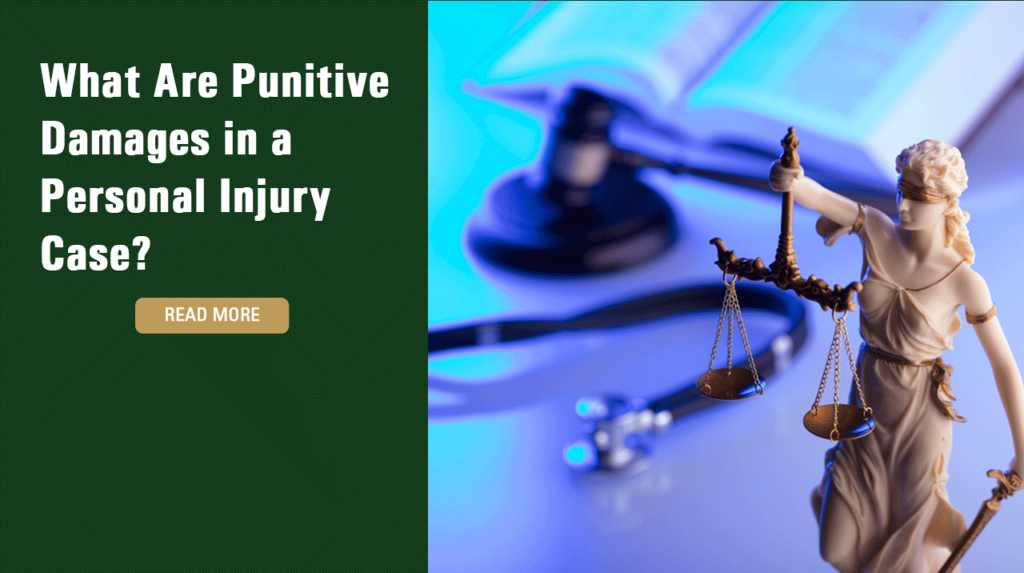What Are Punitive Damages in a Personal Injury Case?

Most personal injury claims will only involve compensatory damages. These are monetary awards that are designed to compensate victims for their economic and non-economic losses. However, other types of damages that might be recovered in some personal injury claims are punitive damages. Instead of being designed to compensate accident victims, punitive damages are awarded to victims to punish the defendants and deter them from engaging in similar behavior in the future. Punitive damages are generally only awarded when a defendant’s behavior amounted to gross negligence and caused catastrophic harm to the victim. Here is what you need to know about punitive damages in a personal injury case from the Raynes & Lawn Philadelphia personal injury attorneys.
What Is the Difference Between Compensatory and Punitive Damages?
Punitive damages are also known as exemplary damages because they are meant to serve as a punishment for the defendants and deter both them and others from engaging in similar behavior to others in the future. When they are awarded, they are payable in addition to the victim’s compensatory damages. By contrast, compensatory damages are monetary amounts to reimburse you for your medical bills, lost wages, property losses, emotional distress, pain and suffering, and other losses. They are meant to pay you for the losses you have already incurred because of your accident and those you can be anticipated to incur in the future. Both special damages that compensate you for your out-of-pocket losses and general damages that compensate you for your non-economic losses are types of compensatory damages.
Why Punitive Damages Are Ordered
Punitive damages might be awarded when a jury believes the defendant needs additional punishment because of their degree of negligence or willful or wanton behavior. However, they are not available in every personal injury case. Instead, they are generally only awarded in rare cases when a jury believes that the compensatory damages are inadequate for the injuries the plaintiff suffered and the defendant’s conduct was outrageous. For example, if you suffered serious injuries in a motor vehicle accident after the other motorist rolled through a stop sign and struck your vehicle, you likely would be entitled to compensatory damages. However, punitive damages likely would not be available in this type of scenario. By contrast, if you were left permanently paralyzed and lost your child after a drunk driver drove the wrong way on a highway and struck your vehicle in a head-on collision, the jury might consider ordering the defendant to pay punitive damages on top of your compensatory damages to punish the defendant and deter others from engaging in similar conduct.

The Process of How Punitive Damages Might Be Awarded
When you claim punitive damages, the judge will use their discretion based on the evidence you present at trial to determine whether the jury will be allowed to consider punitive damages. The judge will need to be convinced by the evidence that the defendant acted knowingly. The jury will then decide about the types of damages and how much to award based on multiple factors, including the severity of your injuries, their permanency, and the degree of negligence the defendant exhibited. Asking for punitive damages does not necessarily mean that you will receive them. According to the U.S. Bureau of Justice Statistics, only 528 plaintiffs out of 25,000 recovered punitive damages after seeking them in 2005. In medical malpractice cases, punitive damages are also capped at no more than 200% of your compensatory damages under 40 Pa.CS § 1303.505. If you win your medical malpractice claim, this means that your punitive damages award cannot be greater than twice the amount of your compensatory damages award. If the jury returns a greater amount, the court will reduce the punitive damages to meet the cap. State law also requires 25% of punitive damages awards in medical malpractice cases to be paid into the state’s MCARE fund and the remaining 75% to be awarded to the prevailing party.
Can You Settle a Claim for Punitive Damages?
It is rare for someone to recover punitive damages at trial. Instead, you will likely focus on recovering compensatory damages. Your attorney can examine the viability of your claim, help to gather supporting evidence and establish that the defendant violated the duty of care and caused your accident and injuries. By doing this, your attorney might help you to negotiate a settlement that fully compensates you for all of your losses. If your attorney believes that you might be entitled to pursue punitive damages, they will explain the options you have for pursuing them.
Get Help from Raynes & Lawn
If you have been seriously injured because of the negligence of another person or entity, your priority should be your physical recovery. Your attorney can then help you to pursue compensation to compensate you for your financial and non-economic losses. Depending on your situation, you might also want to pursue punitive damages to prevent the defendant from harming someone else in the same way they harmed you. The experienced team of personal injury attorneys at Raynes & Lawn has helped thousands of negligence victims hold the responsible parties accountable and recover fair compensation over the past five decades. We can help you understand the merits of your case and the types of damages that might be available. Call us today to schedule a free case evaluation so that you can learn more about your rights at 1-800-535-1797.

For the general public: This Blog/Website is made available by the law firm publisher, Raynes & Lawn, for educational purposes. It provides general information and a general understanding of the law but does not provide specific legal advice. By using this site, commenting on posts, or sending inquiries through the site or contact email, you confirm that there is no attorney-client relationship between you and the Blog/Website publisher. The Blog/Website should not be used as a substitute for competent legal advice from a licensed attorney in your jurisdiction.
For attorneys: This Blog/Website is informational in nature and is not a substitute for legal research or a consultation on specific matters pertaining to your clients. Due to the dynamic nature of legal doctrines, what might be accurate one day may be inaccurate the next. As such, the contents of this blog must not be relied upon as a basis for arguments to a court or for your advice to clients without, again, further research or a consultation with our professionals.
